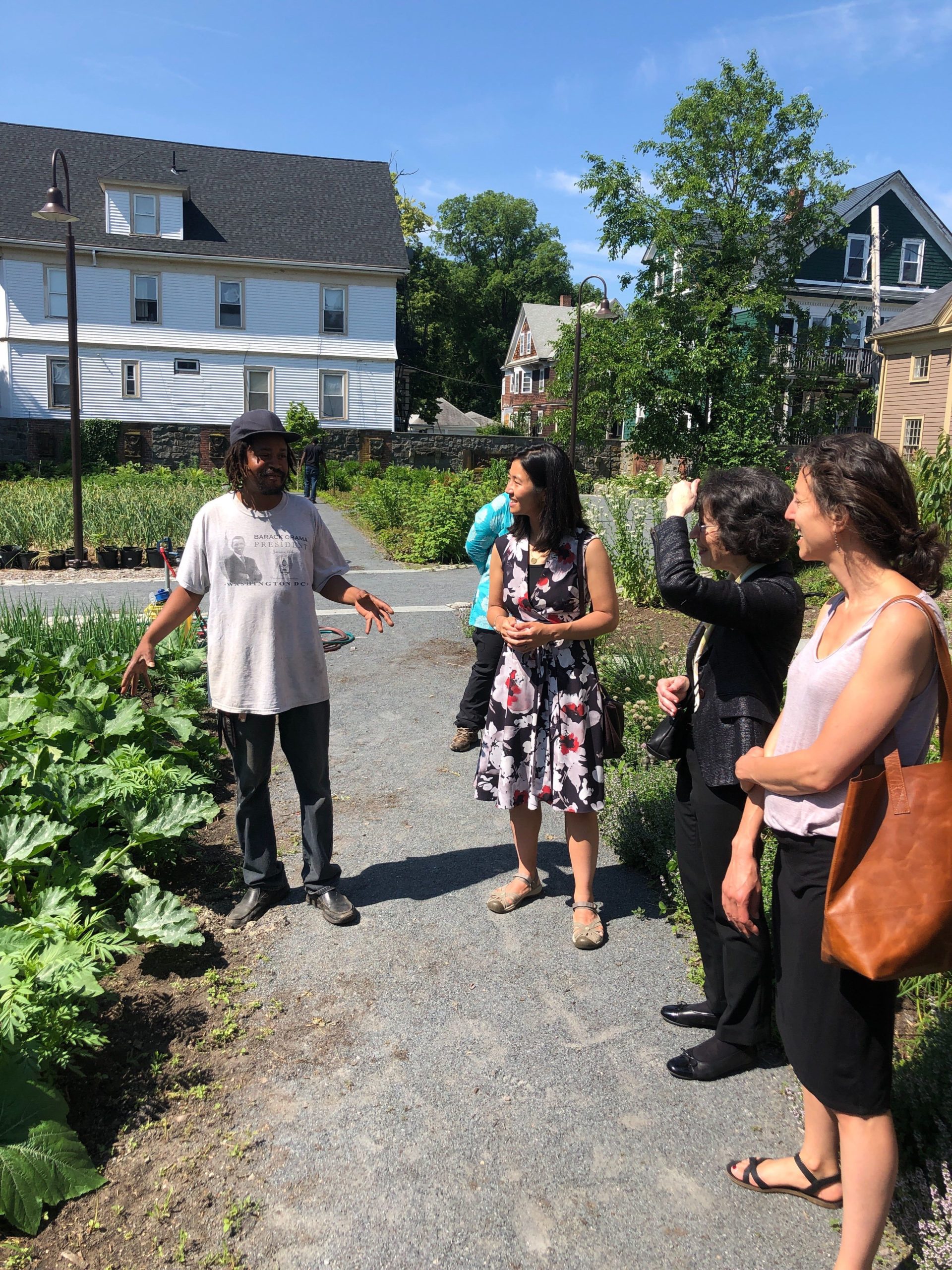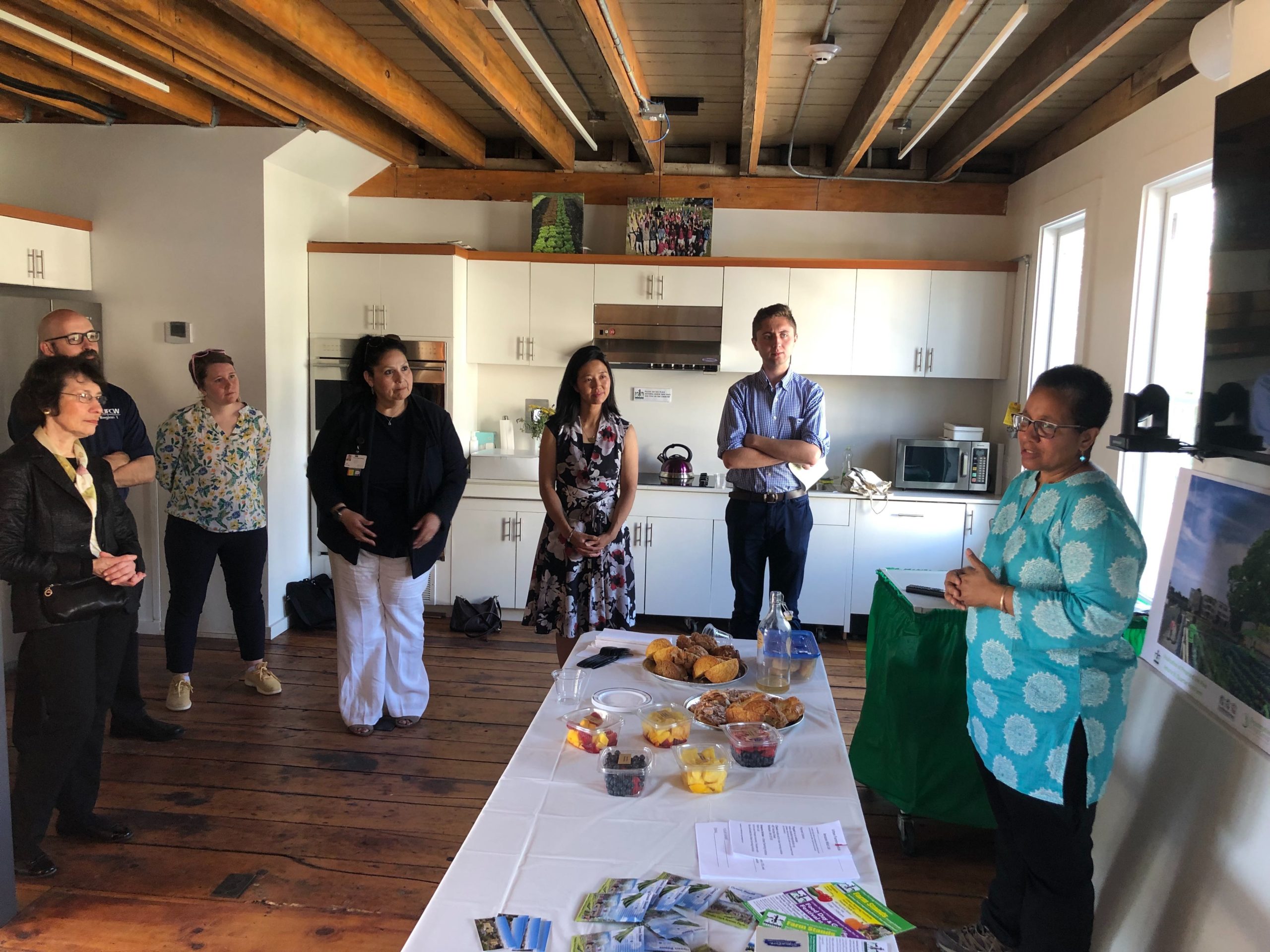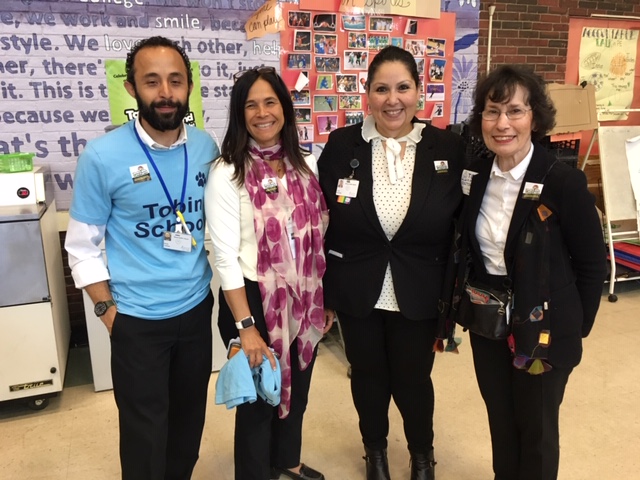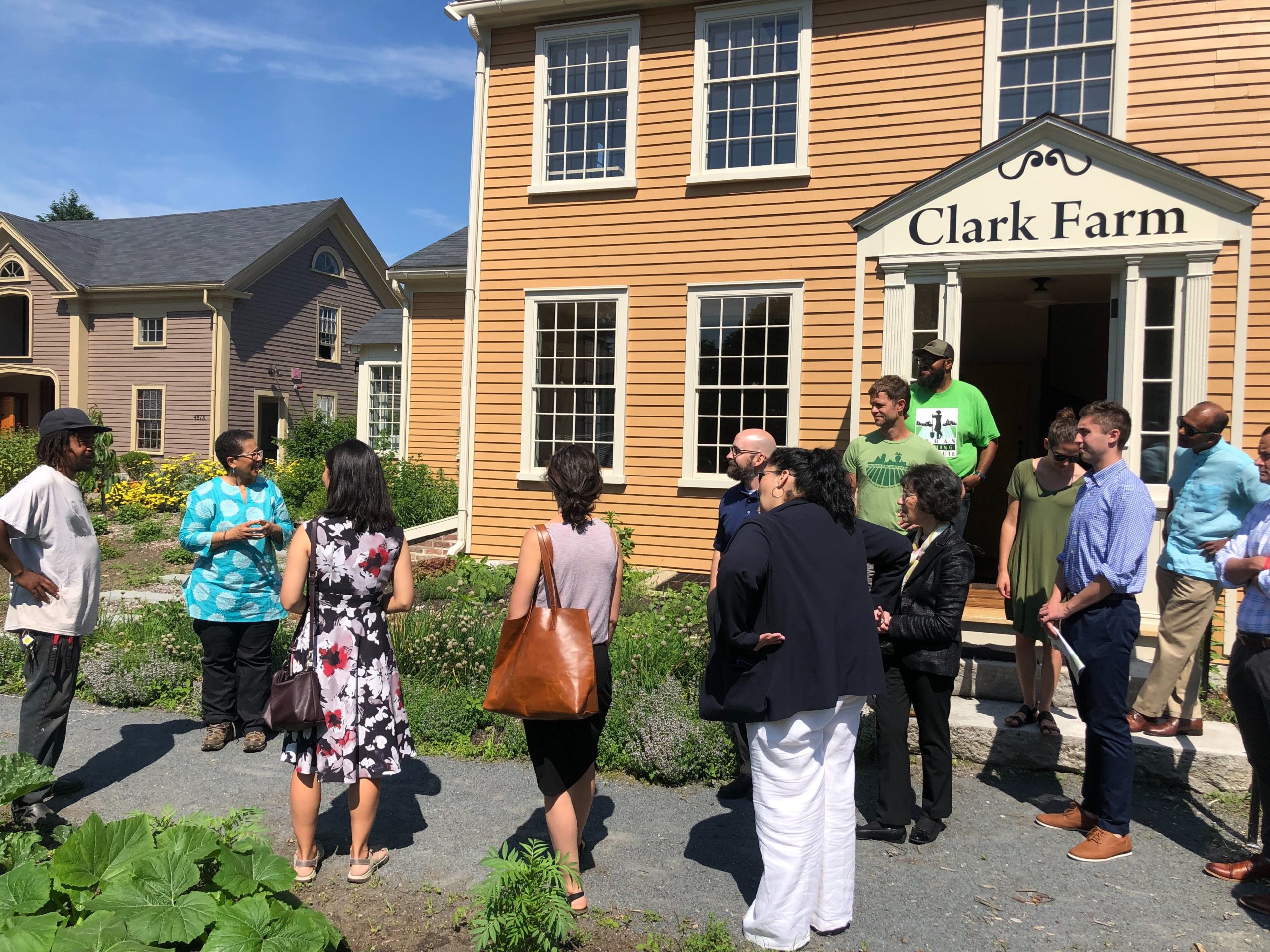Boston’s Good Food Purchasing Policy: Building a more transparent and equitable food system
In March 2019, the Boston City Council passed “An Ordinance Regarding Good Food Purchasing Standards in the City of Boston” to require the city’s departments and agencies to meet new food procurement standards.1 This is a first-of-its-kind ordinance on the East Coast, based on the Center for Good Food Purchasing’s values-based framework for local procurement, the Good Food Purchasing Program (GFPP). To date, the GFPP has been adopted by ten localities across the nation.2
Boston’s GFPP, which will be codified in section 4-9 of chapter 4 of the city’s code, creates procurement standards based on the five core GFPP values (local economies, environmental sustainability, valued workforce, animal welfare, and nutrition). Additionally, Boston’s policy strongly emphasizes racial and economic justice by investing in disadvantaged and minority communities, and introduces a goal of ensuring farmers receive a fair price for their products.3 Passage of this ordinance came after less than a year of formal legislative process, but was the culmination of years of organizing and research from the legislative sponsor and community advocates. It is expected to improve the way food is sourced and served at city agencies and departments, the largest of which is Boston Public Schools, and transform the city’s food procurement processes to one that is based on values, rather than just price point.

| Key Demographics | |
|---|---|
| Population: 1 | 694,583 |
| Land Area (in sq. mi): | 48.28 |
| Race/Ethnicity: | 52.8%-White 25.3%-Black or African American 9.5%-Asian 19.4%-Hispanic/Latino (of any race) |
| Population by Age: | 21.5%-under 18 years 67.5%-18-64 years 11%- 65 years and older |
| Education: | 86.1%-High school graduate or higher 47.4%-Bachelor’s degree or higher |
| Median Household Income: | $62,021 |
| Population in Poverty: | 20.5% (compared to 10% statewide and 15.8% in the U.S. as a whole) |
Background
In Boston, there had been a growing concern over the limitations of the current school facilities in terms of their ability to serve fresh prepared meals, and concern about the school food procurement process in general. “Boston has been having a tough time with school meal programs simply because 85 out of the 125 schools are satellite kitchens, meaning they have no real kitchens at all, so you must rely on pre-plated meals,” said Laura Benavidez, Executive Director of Food and Nutrition Services at Boston Public Schools. Benavidez also noted general concerns expressed by both parents and school leadership with the types of foods served and procurement practices. Boston Public School officials and parent groups wanted to work towards healthier school meals and a more transparent school food procurement process that advanced justice in the food system, which was the initial driver for the policy’s development. In addition, public and private institutions expressed that the city needed to adopt purchasing standards for city departments and agencies that not only considered nutrition, but also environmental sustainability, a valued workforce, animal welfare, and local economies in order to change the way that regional food producers, processors, and distributors are doing business, and to improve the regional food system.

These desires also coincided with other food procurement practice changes throughout the state. For example, since 2010 over 20 private colleges and universities in Massachusetts have made the shift to purchasing more local food. In 2010, state legislators amended the Massachusetts General Laws to encourage public higher education institutions and state agencies to purchase more agricultural products grown in the state. In regard to healthcare institutions, Jennifer Obadia from Healthcare Without Harm has said that “many of the major hospitals across Boston have also made a commitment to purchasing local and sustainably produced foods by signing the Healthy Food in Health Care pledge.” In terms of public procurement more broadly, the City of Boston also recently adopted an ordinance, spearheaded by Councilor At-Large Michelle Wu and then-Councilor At-Large Ayanna Pressley, to promote equity in city contracts by requiring quarterly reporting on equity in city contracting for minority- and women-owned business enterprises and local entrepreneurs.
The Policy Development Process
Timeline of Events
In the summer of 2018, participants from the HEAL Food Alliance’s annual conference came together to discuss the GFPP—a new model of institutional food procurement.8 This initial meeting included representatives from a diverse group of organizations interested in and dedicated to improving food systems. After their initial conversation, they learned that Councilor Michelle Wu had also been working to develop a local food justice ordinance based on the Good Food Purchasing Program adopted by Chicago Public Schools, Chicago Park District in 2017 and then by Cook County, Illinois, in May 2018.9 Councilor Wu had begun researching city-level food justice actions in early 2017 and was later inspired by examples of food purchasing legislation in other cities.
Corporate Accountability, a national organization that runs campaigns centered around holding industries and policymakers accountable through mobilizing stakeholders, participating in negotiations, and building partnerships, participated in the HEAL Food Alliance conference and formed a coalition to help develop the ordinance.10 “We convened and led the coalition meetings and met directly with representatives early on to ensure we had support to move forward with the policy,” said Keltie Vance. She added, “We also liaised with Councilor Wu throughout this time of drafting a policy to provide input to help strengthen the language of the bill.”
The coalition formed by Corporate Accountability was a driving force behind the policy development process, and included organizations such as the Massachusetts Society for the Prevention of Cruelty to Animals, the Food Chain Workers Alliance, Health Care Without Harm, the United Food and Commercial Workers local chapter, and the Massachusetts Farm to School Network. In addition to Director Benavidez, Catalina López-Ospina from the mayor’s Office of Food Access worked with the coalition to develop the GFPP ordinance.
In December 2018, the first draft of the ordinance was sent to the coalition to review. There was also a public hearing at City Hall to receive feedback from community and coalition members. “There were a couple of things noted in the ordinance that we thought could be stronger,” said Simca Horwitz from Massachusetts Farm to School. They noted that transparency was missing from the policy, specifically, language that required a public solicitation process for contracting with new vendors. The coalition saw this as an opportunity for building transparency into the process and allowing the public to engage with the decisions being made but they also knew that they needed to ensure that the ordinance would not conflict with state law. “We reached out to colleagues and Harvard’s Food Law and Policy Clinic to ask for their advice on state regulations around purchasing,” said Horwitz. The Harvard Clinic analyzed state laws around this issue and created a memo outlining where this type of transparency was permitted, which the coalition gave to Councilor Wu.
The second issue that the coalition identified was that the policy lacked language around equity. The coalition looked at the racial equity report that Boston published in 2017 for guidance. “We took that language from the report and put it in the policy,” said Suzanne Adely from the Food Chain Workers Alliance. This language prioritizes food vendors that demonstrate a track record of hiring and investing in local disadvantaged communities; provide a living wage; are local minority, disabled, or women-owned businesses; and operate in low-income communities.
After discussions with Councilor Wu, the proposals around transparency and equity were included in the final policy. From January to the end of February 2019, city councilors held internal working sessions. When the second draft was completed, it was sent to the coalition for review. The coalition approved the second draft and the ordinance passed in a city council meeting on March 20, 2019. On April 12, 2019, the ordinance was signed by the mayor.
It took less than a year for the city to pass this ordinance, which was largely due to the leadership of Councilor Wu, the involvement of Corporate Accountability, and the dedication of the coalition. “Thanks to strong community involvement from a committed coalition, we were able to translate the urgency of food access needs into a quick timeline for this legislative step,” said Councilor Wu. “Boston became the first city in the Northeast to take action in guaranteeing local, healthy, sustainable food procurement, and it has opened up possibilities for even more progress on food access.”
John Stoddard, a coalition member from Health Care Without Harm, was also appreciative of Councilor Wu’s efforts. “Councilor Wu was so on board which helped pass the ordinance quickly,” he said. “However, it would not have been as strong of an ordinance without community input, especially input from the coalition of organizations who represented so many of the stakeholders who are impacted by this new legislation.”


The Final Policy
Boston Public Schools, which has an $18 million food budget, as well as other agencies and departments that have meals programs, such as the Department of Health and Human Services, are required to incorporate Good Food Purchasing Standards into their procurement requests and contracts.11
Boston’s GFPP ordinance requires city departments and agencies, which include Boston Public Schools, to follow Good Food Purchasing Standards, which emphasize the following values:12
- Support small and mid-sized agricultural and food processing operations within the local area or region;
- Support producers that employ sustainable production systems that reduce or eliminate synthetic pesticides and fertilizers; avoid the use of hormones, antibiotics, and genetic engineering; conserve soil and water; protect and enhance wildlife habitat and biodiversity; and reduce on-farm energy consumption and greenhouse gas emissions;
- Protect workers’ rights to freedom of association, to organize a union and collectively bargain in order to better ensure safe and healthy working conditions, fair compensation, and access to health insurance and affordable child care for all food chain workers;
- Ensure farmers a fair price for their products that covers the cost of production and fair remuneration for their management and labor;
- Provide healthy and humane care for farm animals; and
- Promote health and well-being by offering generous portions of vegetables, fruit, and whole grains; reducing salt, added sugars, fats, and oils; and eliminating artificial additives.
Boston’s Good Food Purchasing ordinance is unique, compared to other cities who have passed policies incorporating GFPP values, in that it includes a specific section on equity. The ordinance references the State of Equity in Metro Boston Policy Agenda 2017 and includes a specific goal to address inequities:13
- Encourage prospective food vendors to invest in our disadvantaged and minority communities by including in procurement requests preferences for prospective vendors who demonstrate a track record of hiring and investing in local disadvantaged communities; provide living wages to all their employees, including frontline food workers; are local minority, disabled, and/or women-owned businesses; and are local producers and processors operating in low-income communities and employing non-toxic, environmentally sustainable methods.14
City of Boston’s State of Equity Agenda’s Definition of Equity
How do we define Equity?
Equity is the condition of fair and just inclusion into a society. Equity will exist when those who have been most marginalized have equal access to opportunities, power, participation and resources and all have avenues to safe, healthy, productive, and fulfilling lives. It requires restructuring deeply entrenched systems of privilege and oppression that have led to the uneven distribution of benefits and burdens over multiple generations. Society will be stronger when the promise in all of us is actualized.
With inspiration from: Policy Link and King County Office of Equity and Social Justice.
This language shows that the city is committed to closing the wealth gap and addressing racial equity issues by giving priority to vendors from disadvantaged and minority communities. Boston recently has been found to have some of the largest disparities between the wealthiest and poorest residents, which has prompted the city to develop a set of policy goals and strategies to address disparities.15
Implementation and Next Steps
City agency and department heads are assembling their own Community Advisory Councils, as outlined in the ordinance, to provide guidance during the implementation phase. These Councils must have at least one representative from each of the GFPP value categories (listed above).
City departments and agencies that engage in food procurement will adopt the Good Food Purchasing Standards as a framework for purchasing, according to the timeline included in the ordinance.16 By April 2020, they must communicate these standards to their suppliers and distributors and request data to help the department or agency complete a baseline assessment of procurement practices.17 Six months after the baseline assessment is completed, they must develop and adopt an action plan with “benchmarks” to measure progress towards the standards, including accountability systems to confirm “sourcing commitments and assess current food procurement practices.”18


The City of Boston felt strongly that it was important to ensure a transparent process in order to “charter an ever-improving path toward greater sustainability in Boston food procurement.”19 The city also understood the dual importance of ensuring vendor confidentiality and a competitive process, as well as providing transparency and built-in time for public review and comments.
According to the ordinance, within one year after their baseline assessment has been completed, city departments and agencies must incorporate the Good Food Purchasing Standards into new procurement contracts and requests.20 First, the Office of Neighborhood Services will send a representative, who also represents “city constituents,” to a department or agency to evaluate how they respond to procurement requests.21 Second, the department or agency will hold a public hearing “within 60 days of final approval and acceptance of responses to procurement requests.”22 Lastly, they must publicly post on their website their evaluation process, reason for selection, and all procurement requests and supporting information, 30 days prior to the public hearing.23 Any confidential business information that is protected by the State of Massachusetts will not be included in the release.24
In terms of reporting, city departments and agencies that are subject to this ordinance must share an annual progress report with the City Council, which will be publicly available online and in print. Within two years of completing the baseline assessment, city agencies and departments will request their first annual assessment from the Center for Good Food Purchasing, which they will present at a public hearing. The assessment will be shared online and at all Boston Public Libraries in print form 30 days prior to the public hearings. The public hearing is an opportunity for each department or agency to “receive public comments on the progress…toward more sustainable procurement under the Good Food Purchasing Program.”25 Each year going forward city departments and agencies will continue to request an annual assessment from the Center for Good Food Purchasing and present an annual public hearing.
Anticipated Policy Impact and Challenges
This policy has the potential to have a significant impact on institutional food procurement for city departments and agencies in Boston and will likely have a ripple effect on food distributors, farmers, and farmworkers, among others in the region. City agencies and departments will need to follow the steps outlined in the ordinance, which will require additional time and effort on their part. Food producers and distributors hoping to sell to agencies and departments in the City of Boston will likely need to change their own practices to adhere to, or at least make progress in the direction of, the Good Food Purchasing Standards.

After adopting the GFPP, the Los Angeles Unified School District saw a large increase in the percentage of local fruits and vegetables served, from 9 percent to 75 percent in just the first two years. 26The anticipated impact is extremely positive based on what other localities have seen, though the full impact of the ordinance in Boston is unclear at this time because the legislation is so new and Boston Public Schools have been operating remotely since March 2020 with meals being distributed at school sites throughout the community during the COVID-19 pandemic.
Laura Benavidez from Boston Public Schools suggests there is more work to be done before Boston will see the results they want from this policy change. One potential issue is the way that Boston Public Schools contracts with food suppliers and distributors.
“Right now, our contracts are annual. We may ask our distribution contracts to sign a contract based on these standards, but that contract will be up and ready for renewal in a year,” said Benavidez. Some departments are considering allowing for possible extensions of contracts if they are meeting GFPP standards and benchmarks to address this issue.
Another anticipated challenge is pricing. Departments and agencies are anticipating higher costs for the food that meets GFPP standards. Benavidez explained, “The concerns with GFPP is that we can incorporate the ordinance’s language into our bids but at the end of the day when you are going through a bid, it doesn’t matter how amazing and how much they meet the GFPP standards, if the bid price is too expensive, we simply cannot choose them.Therefore, we need to rethink the process, which is moving from bids to Request for Proposals (RFPs). This is a lengthier process but focuses on additional values besides price.” Consequently, purchasing agencies and departments may not be able to afford food that meets all GFPP standards.
Some coalition members are concerned generally with the implementation phase. “I think it will be really challenging to ask the city, which is an enormous bureaucracy, to significantly change the way they do things,” said Simca Horwitz from Massachusetts Farm to School. “However, the point is to challenge the way that cities currently purchase.” It appears that the city stands behind the values of this ordinance, but the actual mechanics of implementation will be significantly more complex to tackle.
Lessons learned
Some key lessons and best practices were shared by the experts we spoke with for this case study. These lessons include the following:
- Understand and consider relevant state laws when drafting local laws. Whenever looking to pass a local law, consider relevant state laws to ensure that your proposed local law does not conflict with state law. In this case, the Harvard Food Law and Policy Clinic provided guidance to the City of Boston in terms of Massachusetts procurement law and what provisions could be included in the ordinance regarding transparency.
- Build a diverse coalition of invested stakeholders. The coalition convened by Corporate Accountability included many stakeholder groups deeply involved in the policy development process. This group represented multiple perspectives and provided constructive feedback to the City Councilors who were drafting the policy. Ultimately, the final policy was stronger because of their involvement.
- Explicitly prioritize racial equity. Many cities across the U.S. are developing equity language to guide their policy decisions. By specifically including an equity GFPP value, prospective food vendors are encouraged to invest in disadvantaged and minority communities (see section above for more detail). Also of note, in the Metro Boston Policy Agenda one of the key guiding principles for policy priorities is to lead with racial equity.27 For example, Boston passed a policy tasking the Small and Local Business Enterprise Office to develop a Supplier Diversity Program in order to ensure that minority- and women-owned businesses are aware of and considered for city contract opportunities.28
- Find the support of a local policy champion. Councilor Michelle Wu was a strong proponent of the Good Food Purchasing Program and was determined to get a policy passed in Boston. With her efforts, the policy passed in less than a year.
- Be prepared for challenges that come up during implementation. Especially with ambitious policies, it is important to understand the anticipated challenges and be proactive in addressing issues during the policy development process as much as possible. In this case, some institutional buyers have expressed concerns about pricing and contract durations, as noted above.
About the Healthy Food Policy Project (HFPP)
HFPP identifies and elevates local laws that seek to promote access to healthy food while also contributing to strong local economies, an improved environment, and health equity, with a focus on socially disadvantaged and marginalized groups. HFPP is a four-year collaboration of Vermont Law School’s Center for Agriculture and Food Systems, the Public Health Law Center, and the Rudd Center for Food Policy and Obesity at the University of Connecticut. This project is funded by the National Agricultural Library, Agricultural Research Service, U.S. Department of Agriculture.
Notes
1CITY OF BOSTON, MA, CODE ch. 4, § CBC 4-8 4 (Apr. 2019) https://www.universalhub.com/files/goodfood.pdf.
2 Center for Good Food Purchasing, https://goodfoodpurchasing.org/.
3 Center for Health Law and Policy Innovation, “Boston City Council Passes Good Food Purchasing Program,” Harvard Law School (April 2019), https://www.chlpi.org/boston-city-council-passes-good-food-purchasing-program/.
4 Laura Benavidez. Personal interview. March 6, 2020.
5 Jonathan Abrams, et. al, ”Increasing Local Food Procurement by Massachusetts State Colleges & Universities,” 26 Harvard Food Law and Policy Clinic, https://www.chlpi.org/wp-content/uploads/2013/12/Increasing-Local-Food-Procurement-by-Mass-State-Colleges-FINAL2.pdf.
6 Ma. G.L. Chapter 7 § 23(B).
7 Healthcare Without Harm, https://noharm-uscanada.org/issues/us-canada/healthy-food-pledge-signers.
8 Heal Food Alliance, https://healfoodalliance.org/summit/.
9 Colleen McKinney, “Chicago Food Policy Action Council secures Good Food Purchasing Program for City of Chicago,” Center for Good Food Purchasing (October 2017), https://goodfoodpurchasing.org/chicago-food-policy-action-council-secures-good-food-purchasing-program-for-city-of-chicago/.See See Resolution 18-1650: https://drive.google.com/file/d/17QqiYqDwpuQZ7R5s9RRfuIBROXMhkLK2/view?ts=5afaf02b.
10 Corporate Accountability, https://www.corporateaccountability.org/what-we-do/.
11 See Report of Committee Chair 1 (March 15, 2019), https://www.universalhub.com/files/goodfood.pdf: “The ordinance is meant to apply to departments or agencies responsible for procurement or service contracting of foods, which currently applies primarily to the Boston Public Schools, with its $18 million food budget.”
12 Massachusetts has state dependent public school systems and Boston Public Schools are considered a department of municipal government. See Doug Geverdt, 2012 Census of Governments, State Descriptions: School District Governments and Public School Systems 41 (February 2018), https://nces.ed.gov/programs/edge/data/School_District_Descriptions_from_Census_of_Governments.pdf.
See also Massachusetts Department of Elementary and Secondary Education, Public School Districts, http://profiles.doe.mass.edu/profiles/general.aspx?topNavId=1&orgcode=00350000&orgtypecode=5&leftNavId=102&.
13 Barry Keppard, et.al, “State of Equity for Metro Boston: Policy Agenda Update,” City of Boston (February 2018), https://equityagenda.mapc.org/uploads/9.10%20SOEREPORT_FINAL.pdf.
14 CITY OF BOSTON, MA, CODE ch. 4, § CBC 4-8 5 (Apr. 2019), https://www.universalhub.com/files/goodfood.pdf.
15 Ana Patricia Muñoz, Marlene Kim, Mariko Chang, Regine O. Jackson, Darrick Hamilton, & William A. Darity, Jr., The Color of Wealth in Boston, Federal Reserve of Boston (March 2015).
16 CITY OF BOSTON, MA, CODE ch. 4, § CBC 4-8 5 (Apr. 2019),https://www.universalhub.com/files/goodfood.pdf.
17 CITY OF BOSTON, MA, CODE ch. 4, § CBC 4-8 5 (Apr. 2019),https://www.universalhub.com/files/goodfood.pdf.
18 CITY OF BOSTON, MA, CODE ch. 4, § CBC 4-8 6 (Apr. 2019),https://www.universalhub.com/files/goodfood.pdf.
19 CITY OF BOSTON, MA, CODE ch. 4, § CBC 4-8 6 (Apr. 2019),https://www.universalhub.com/files/goodfood.pdf.
20 CITY OF BOSTON, MA, CODE ch. 4, § CBC 4-8 6 (Apr. 2019),https://www.universalhub.com/files/goodfood.pdf.
21 CITY OF BOSTON, MA, CODE ch. 4, § CBC 4-8 6 (Apr. 2019),https://www.universalhub.com/files/goodfood.pdf.
22 CITY OF BOSTON, MA, CODE ch. 4, § CBC 4-8 6 (Apr. 2019),https://www.universalhub.com/files/goodfood.pdf.
23 CITY OF BOSTON, MA, CODE ch. 4, § CBC 4-8 6 (Apr. 2019),https://www.universalhub.com/files/goodfood.pdf.
24 CITY OF BOSTON, MA, CODE ch. 4, § CBC 4-8 6 (Apr. 2019),https://www.universalhub.com/files/goodfood.pdf.
25 CITY OF BOSTON, MA, CODE ch. 4, § CBC 4-8 7 (Apr. 2019),https://www.universalhub.com/files/goodfood.pdf.
26 “Tracking the Ripple Effects of LA’s Good Food Purchasing Program,” Policy Link (January 7, 2016), https://www.policylink.org/equity-in-action/la-good-food-purchasing-program.
27 State of Equity for Metro Boston Policy Agenda, https://equityagenda.mapc.org/.
28 CITY OF BOSTON, MA, CODE ch. 4, § 4-4 (October 2017), https://codelibrary.amlegal.com/codes/boston/latest/boston_ma/0-0-0-417.
Key Demographics Table Notes
1 https://www.census.gov/quickfacts/bostoncitymassachusetts.


